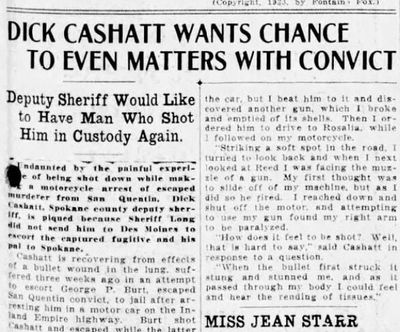100 years ago in Spokane: The deputy shot by a San Quentin escapee shared how it felt – and his desire for justice

Dick Cashatt, the Spokane County deputy who was shot by escaped convict George P. Burt, said he would “give anything to go to Des Moines and bring those fellows back.”
That probably wasn’t going to happen, for two reasons. First, Burt and his accomplice were probably headed not to Spokane, but back to San Quentin, to serve the rest of their life sentences. Second, Cashatt was still weakened from taking a bullet to the lung.
Cashatt told reporters he had confiscated two guns from Burt after he stopped him near Rosalia, Washington. He did not know that Burt had a third gun.
How did it feel to be shot?
“Well, that is hard to say,” Cashatt said. “When the bullet first struck, it stung and stunned me, and as it passed through my body I could feel and hear the tearing of tissues.”
From the labor beat: In a rare admission of error, the Loyal Legion of Loggers and Lumbermen – a group of owners – called a special meeting to “consider ways and means to remove the causes of discontent among the employees.”
This was precipitated by a recent strike by the Industrial Workers of the World (Wobblies). While most mills continued to run, some of the region’s logging camps were shut down.
The organization planned to address the root cause of the discontent by proposing a wage raise of $3 per day, which would raise the daily rate to $7.04.
The owners also said they would also address other “evils prevailing in the camps,” but did not specify what those evils might be.
From the music beat: The Minneapolis Symphony Orchestra performed at Spokane’s Auditorium Theater in what the Spokane Daily Chronicle called “a real triumph.”
The program included soprano Anne Roselle, for the Metropolitan Opera, who sang arias by Mozart, Leoncavallo and Verdi.
The Chronicle critic said the orchestra combined “brilliance with ponderosity,” which perhaps was meant as a compliment.